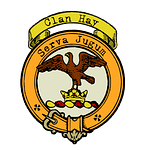Welcome back to A Clan A Day, where we explore the histories of Scotland's most storied clans. I'm your host, Colin MacDonald, and today, we journey into the Highlands to uncover the rich and complex legacy of Clan Mackenzie, one of the most powerful and influential clans in Scottish history.
The origins of Clan Mackenzie are steeped in both legend and historical debate. The traditional tale recounts that the Mackenzies descended from Colin Fitzgerald, a noble of Norman-Irish lineage who, according to some accounts, was granted the lands of Kintail by King Alexander III as a reward for his bravery at the Battle of Largs in 1263. This story, although cherished by the clan for centuries, has been challenged by historians who argue that the Mackenzies are more likely descended from a Gaelic lineage, specifically from Gilleoin of the Aird, a notable figure in the early 12th century.
Regardless of their true origins, by the 14th century, the Mackenzies had firmly established themselves in the rugged landscapes of Kintail in Wester Ross, where they would rise to prominence. The earliest known chief of the clan was Murdoch Mackenzie, who, in 1362, received a charter for the lands of Kintail from King David II. This marked the beginning of the Mackenzies' ascendancy, as they expanded their influence throughout the Highlands.
The Mackenzies were a clan known for their resilience and strategic prowess, navigating the complex web of alliances and feuds that characterized Highland politics. One of their most significant conflicts was with the powerful Clan Macdonald, Lords of the Isles. In the late 15th century, this rivalry culminated in the Battle of Blar Na Pairce in 1491, where the Mackenzies emerged victorious, solidifying their power in the region.
As the 16th century dawned, the Mackenzies continued to grow in strength under the leadership of Kenneth Mackenzie, 10th of Kintail. Known as "Kenneth of the Battle," he played a crucial role in the Battle of Flodden in 1513, where he and his clan fought valiantly for Scotland. Although many Mackenzies fell that day, their bravery furthered their reputation as formidable warriors.
The clan’s expansion was not only through battle but also through strategic marriages and alliances. The Mackenzies were known for their ability to navigate the treacherous political landscape of Scotland, often securing advantageous marriages that brought them new lands and influence. One such alliance was the marriage of Kenneth Mackenzie, 11th of Kintail, to Barbara Grant, daughter of the Laird of Grant. This union brought the Mackenzies closer to the influential Grant family and added to their growing network of power.
The Mackenzies also found themselves embroiled in internal strife, particularly with the Munros, another powerful Highland clan. The most notable of these feuds occurred in 1570 when the Munros and Mackenzies clashed over the possession of Castle Chanonry of Ross. The conflict was intense, with many lives lost on both sides, but ultimately, the Mackenzies emerged victorious, taking control of the castle and further consolidating their dominance in the north.
In the 17th century, the Mackenzies reached the zenith of their power. Colin Mackenzie, 11th of Kintail, was created Earl of Seaforth in 1623 by King James VI. This title not only recognized the Mackenzies' vast influence but also granted them significant political power. As the Earls of Seaforth, the Mackenzies controlled vast territories, including the Isle of Lewis, which they had wrested from the Macleods after a prolonged and bloody struggle.
The Civil Wars of the mid-17th century tested the Mackenzies' loyalties. The second Earl of Seaforth initially sided with the Covenanters, a faction opposed to King Charles I, but later switched his allegiance to the Royalists. This wavering stance ultimately led to his excommunication by the Covenanters and imprisonment, a stark reminder of the perilous nature of Highland politics.
Despite these challenges, the Mackenzies remained a force to be reckoned with. In the Jacobite uprisings of 1715 and 1745, the Mackenzies once again took center stage. During the 1715 Rising, William Mackenzie, 5th Earl of Seaforth, led his clan in support of the Stuart cause. However, after the failed uprising, the Earl was forced into exile, and his estates were forfeited. The clan’s fortunes were further complicated during the 1745 Rising, when the Mackenzie chief, Lord Fortrose, remained loyal to the British government, while his cousin, George Mackenzie, 3rd Earl of Cromartie, supported the Jacobites. This division weakened the clan, and the subsequent defeat of the Jacobites at Culloden spelled the end of the Mackenzies' political power.
The forfeiture of the Seaforth estates marked a turning point in the clan’s history, yet the Mackenzies continued to play a significant role in Scotland's military and cultural life. The clan produced several distinguished regiments, including the Seaforth Highlanders, who served with distinction in the British Army.
In the 19th century, the Seaforth title became extinct, but the Mackenzie name lived on through the numerous branches of the clan, such as the Mackenzies of Gairloch, whose lands remain among the largest holdings in the Highlands today. The seat of the clan, Castle Leod, still stands near Strathpeffer, a testament to the enduring legacy of the Mackenzie chiefs.
Clan Mackenzie’s history is a tale of resilience, ambition, and adaptability. From their early days as vassals of the Earls of Ross to their rise as one of the most powerful clans in the Highlands, the Mackenzies have left an indelible mark on Scotland’s history. Today, the Clan Mackenzie Society continues to celebrate this rich heritage, ensuring that the stories of their ancestors are preserved for future generations.











